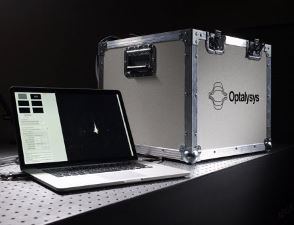



Date:21/11/16
 The rise of high-performance computing (HPC) responds to the ever-increasing demand for more efficient and powerful processing devices to help solve some of the world’s greatest problems.
The rise of high-performance computing (HPC) responds to the ever-increasing demand for more efficient and powerful processing devices to help solve some of the world’s greatest problems.
This is where we come in – to enable our computational biology research, our scientists need to process an enormous amount of biological data facilitated by HPC.
A 4300% growth in annual data generation by 2020 is predicted. With such a considerable increase in data, the problems of energy efficiency, high expectancy and the rising cost of compute resources will only become more pressing.
EI and the HPC hardware provider Optalysys joined forces to introduce the ground-breaking optical processing device GENESYS to perform large-scale DNA sequence searches for crucial genomics research powered by just a mains supply, and aims to be one of the top 50 fastest processing devices in the world by 2017.
Some of the largest high-performance computers cost millions of dollars so they are not cheap. Performance and scale are typically the main drivers for HPC; the trade-off is usually more cost for better speed and scale. This is where optical computing is hoping to break the trend.
HPC systems collectively consume up to 130KW of power, including mechanically removing heat. Powered by optical light, GENESYS is expected to reduce our energy consumption by over 95% - significantly reducing the environmental impact of running traditional HPC.
HPC systems consume vast amounts of power and generate significant heat e.g. the world's fastest supercomputer the Tianhe-2 uses 24MW of power and costs $21m/year to run. A comparable optical ‘supercomputer’ based on Optalysys technology will run from a standard mains supply, consuming, at least, four orders of magnitude less power.
A EI Benchmark BLAST search on a single HPC node takes 28 hrs with a measured energy footprint of 11.2 kWh (including cooling). From this, with the optical processor, it is estimated that an annual cost saving will be over £40k.
Optalysys announces the world's first modern optical coprocessor GENESYS
 The rise of high-performance computing (HPC) responds to the ever-increasing demand for more efficient and powerful processing devices to help solve some of the world’s greatest problems.
The rise of high-performance computing (HPC) responds to the ever-increasing demand for more efficient and powerful processing devices to help solve some of the world’s greatest problems.This is where we come in – to enable our computational biology research, our scientists need to process an enormous amount of biological data facilitated by HPC.
A 4300% growth in annual data generation by 2020 is predicted. With such a considerable increase in data, the problems of energy efficiency, high expectancy and the rising cost of compute resources will only become more pressing.
EI and the HPC hardware provider Optalysys joined forces to introduce the ground-breaking optical processing device GENESYS to perform large-scale DNA sequence searches for crucial genomics research powered by just a mains supply, and aims to be one of the top 50 fastest processing devices in the world by 2017.
Some of the largest high-performance computers cost millions of dollars so they are not cheap. Performance and scale are typically the main drivers for HPC; the trade-off is usually more cost for better speed and scale. This is where optical computing is hoping to break the trend.
HPC systems collectively consume up to 130KW of power, including mechanically removing heat. Powered by optical light, GENESYS is expected to reduce our energy consumption by over 95% - significantly reducing the environmental impact of running traditional HPC.
HPC systems consume vast amounts of power and generate significant heat e.g. the world's fastest supercomputer the Tianhe-2 uses 24MW of power and costs $21m/year to run. A comparable optical ‘supercomputer’ based on Optalysys technology will run from a standard mains supply, consuming, at least, four orders of magnitude less power.
A EI Benchmark BLAST search on a single HPC node takes 28 hrs with a measured energy footprint of 11.2 kWh (including cooling). From this, with the optical processor, it is estimated that an annual cost saving will be over £40k.
Views: 568
©ictnews.az. All rights reserved.Similar news
- The mobile sector continues its lead
- Facebook counted 600 million active users
- Cell phone testing laboratory is planned to be built in Azerbaijan
- Tablets and riders outfitted quickly with 3G/4G modems
- The number of digital TV channels will double to 24 units
- Tax proposal in China gets massive online feedback
- Malaysia to implement biometric system at all entry points
- Korea to build Green Technology Centre
- Cisco Poised to Help China Keep an Eye on Its Citizens
- 3G speed in Azerbaijan is higher than in UK
- Government of Canada Announces Investment in Green Innovation for Canada
- Electric cars in Azerbaijan
- Dominican Republic Govt Issues Cashless Benefits
- Spain raises €1.65bn from spectrum auction
- Camden Council boosts mobile security





















